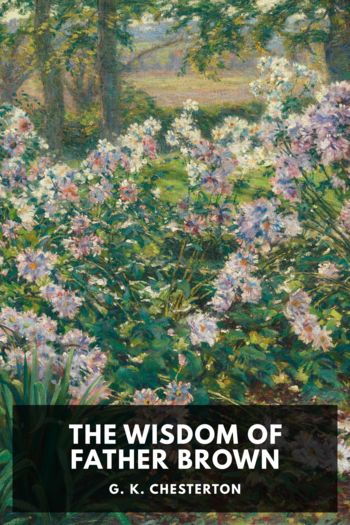The Club of Queer Trades - G. K. Chesterton (highly recommended books .txt) 📗

- Author: G. K. Chesterton
Book online «The Club of Queer Trades - G. K. Chesterton (highly recommended books .txt) 📗». Author G. K. Chesterton
Nothing but his lips had moved as he spoke, and his glasses still shone like two pallid moons.
Grant was shaking with laughter as he watched him.
“True,” he said, “there is no inconsistency, my son of the red spear. But there is a great deal of incompatibility of temper. I am very far from being certain that the Zulu is on an inferior evolutionary stage, whatever the blazes that may mean. I do not think there is anything stupid or ignorant about howling at the moon or being afraid of devils in the dark. It seems to me perfectly philosophical. Why should a man be thought a sort of idiot because he feels the mystery and peril of existence itself? Suppose, my dear Chadd, suppose it is we who are the idiots because we are not afraid of devils in the dark?”
Professor Chadd slit open a page of the magazine with a bone paper-knife and the intent reverence of the bibliophile.
“Beyond all question,” he said, “it is a tenable hypothesis. I allude to the hypothesis which I understand you to entertain, that our civilization is not or may not be an advance upon, and indeed (if I apprehend you), is or may be a retrogression from states identical with or analogous to the state of the Zulus. Moreover, I shall be inclined to concede that such a proposition is of the nature, in some degree at least, of a primary proposition, and cannot adequately be argued, in the same sense, I mean, that the primary proposition of pessimism, or the primary proposition of the nonexistence of matter, cannot adequately be argued. But I do not conceive you to be under the impression that you have demonstrated anything more concerning this proposition than that it is tenable, which, after all, amounts to little more than the statement that it is not a contradiction in terms.”
Basil threw a book at his head and took out a cigar.
“You don’t understand,” he said, “but, on the other hand, as a compensation, you don’t mind smoking. Why you don’t object to that disgustingly barbaric rite I can’t think. I can only say that I began it when I began to be a Zulu, about the age of ten. What I maintained was that although you knew more about Zulus in the sense that you are a scientist, I know more about them in the sense that I am a savage. For instance, your theory of the origin of language, something about its having come from the formulated secret language of some individual creature, though you knocked me silly with facts and scholarship in its favour, still does not convince me, because I have a feeling that that is not the way that things happen. If you ask me why I think so I can only answer that I am a Zulu; and if you ask me (as you most certainly will) what is my definition of a Zulu, I can answer that also. He is one who has climbed a Sussex apple-tree at seven and been afraid of a ghost in an English lane.”
“Your process of thought—” began the immovable Chadd, but his speech was interrupted. His sister, with that masculinity which always in such families concentrates in sisters, flung open the door with a rigid arm and said:
“James, Mr. Bingham of the British Museum wants to see you again.”
The philosopher rose with a dazed look, which always indicates in such men the fact that they regard philosophy as a familiar thing, but practical life as a weird and unnerving vision, and walked dubiously out of the room.
“I hope you do not mind my being aware of it, Miss Chadd,” said Basil Grant, “but I hear that the British Museum has recognized one of the men who have deserved well of their commonwealth. It is true, is it not, that Professor Chadd is likely to be made keeper of Asiatic manuscripts?”
The grim face of the spinster betrayed a great deal of pleasure and a great deal of pathos also. “I believe it’s true,” she said. “If it is, it will not only be great glory which women, I assure you, feel a great deal, but great relief, which they feel more; relief from worry from a lot of things. James’ health has never been good, and while we are as poor as we are he had to do journalism and coaching, in addition to his own dreadful grinding notions and discoveries, which he loves more than man, woman, or child. I have often been afraid that unless something of this kind occurred we should really have to be careful of his brain. But I believe it is practically settled.”
“I am delighted,” began Basil, but with a worried face, “but these red-tape negotiations are so terribly chancy that I really can’t advise you to build on hope, only to be hurled down into bitterness. I’ve known men, and good men like your brother, come nearer than this and be disappointed. Of course, if it is true—”
“If it is true,” said the woman fiercely, “it means that people who have never lived may make an attempt at living.”
Even as she spoke the professor came into the room still with the dazed look in his eyes.
“Is it true?” asked Basil, with burning eyes.
“Not a bit true,” answered Chadd after a moment’s bewilderment. “Your argument was in three points fallacious.”
“What do you mean?” demanded Grant.
“Well,” said the professor slowly, “in saying that you could possess a knowledge of the essence of Zulu life distinct from—”
“Oh! confound Zulu life,” cried





Comments (0)